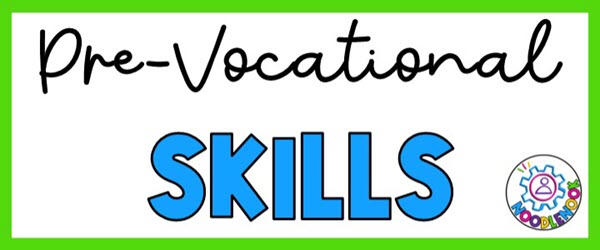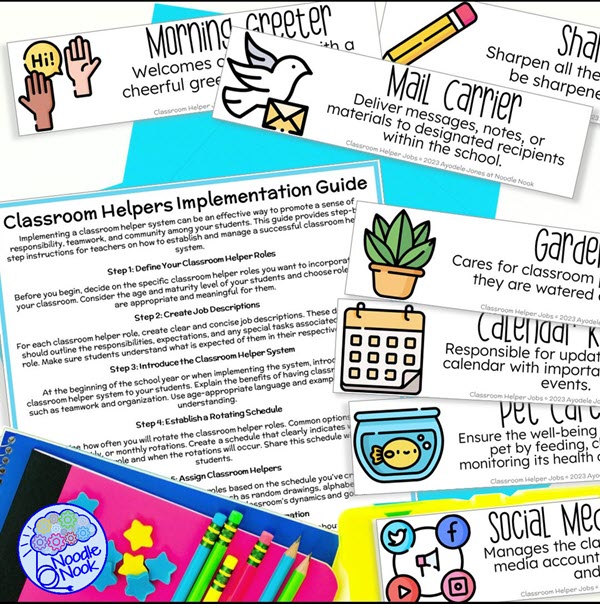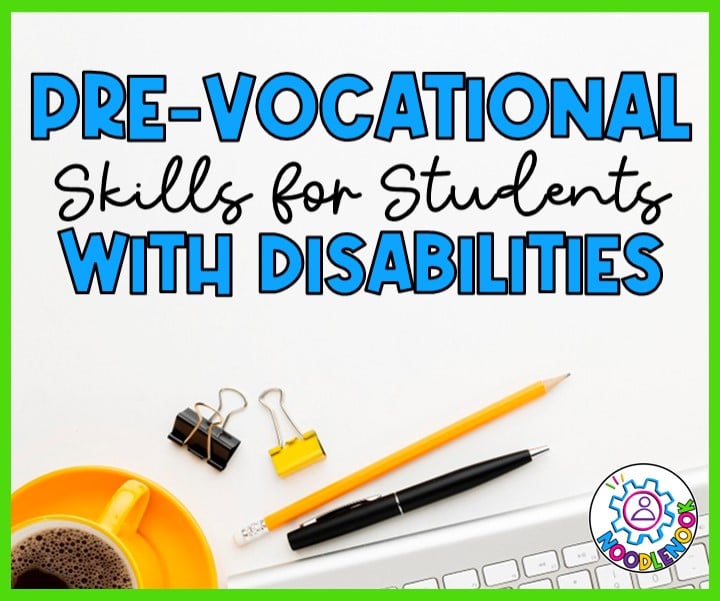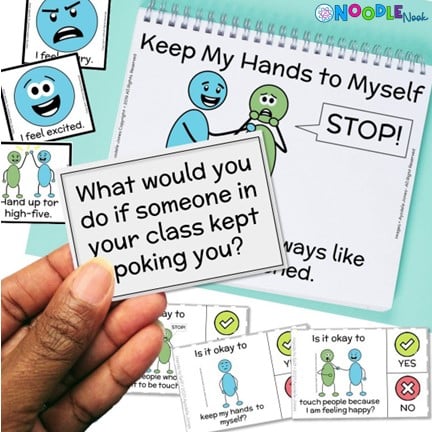In the world of special education, it’s all about preparing students with disabilities to be more independent and learn the essential life skills that will make them successful in life after graduation. To ensure post-secondary success, we have to include pre-vocational skills for students with disabilities as part of our daily instruction. For special education teachers, this task is not only one of our responsibilities, but it’s an absolute imperative in properly preparing students. In this post, we’ll cover prevocational skills for special needs students, including the life skills every student in your classroom should learn.
INTRO: Prevocational Skills for Special Needs Students
As special education teachers, we play a pivotal role in preparing students for the real world. It’s easy to focus on money skills or social problem-solving as part of a student’s education plans as a way to improve their quality of life. Most high school students will participate in some type of vocational education or vocational assessment to determine the types of jobs that would be appropriate for them. That’s all well and good for neurotypical students who are getting ready to hit the job market or continue their education. For students with cognitive development delays, developmental disabilities, or any special needs children, preparation needs to start well before high school. As early as possible, even as early as kindergarten, we need to develop our students’ academic abilities. We also need to target pre-vocational skills for students with disabilities. We do this so that our students are equipped with the tools that they need to become self-sustainable and employable. It can be overwhelming To think about targeting pre-vocational training and young children, but starting early has a significant impact on our students’ lives.
Why Prevocational Skills Matter!
Establishing prevocational skills can seem daunting as a special education teacher, but when students gain essential skills it opens the doors to greater independence and potential employment opportunities. When we teach critical prevocational skills, like time management, social skills, and communication skills, the ultimate goal is to prepare our students for independent living and successful futures. When our students are able to establish a self-sustainable life, they are more likely to have overall satisfaction and general well-being. To get them there, we need prevocational skills to provide the foundation for overcoming any challenges that may accompany living with a disability.
To start, it’s essential to have well-crafted pre-vocational curriculum in the classroom. This curriculum should be tailored to the unique needs of special education students. It should also target the development of job-seeking skills, etiquette-related skills, and pre-vocational skills training. For a lot of students in special education, work task boxes are the norm. These target basic knowledge from early childhood through training young adults. But work boxes alone will not build the job skills necessary for a student to dazzle potential employers and sustain a well-paying job. So let’s cover some of the key areas for prevocational skill building.
Key Areas for Pre-Vocational Skill Building
To effectively prepare special needs students for potential employment and life after graduation, it’s essential to focus on specific topics as part of your lesson plans. Developing these skill sets will improve the employment rate for your students in the postsecondary. On top of that, it’s a great way to take some small steps toward building employment skills and setting a strong foundation for real-world success.
1. Communication Skills:
Communication is a fundamental life skill. Special education students should learn how to express themselves, understand others, and use their voice tone effectively. Through focused lessons, they can develop the necessary skills for successful interactions.
- Younger Students: Role-playing simple dialogues, encouraging students to express their preferences, and practicing basic conversational skills.
- Older Students: Engage in group discussions, debates, or presentations to enhance their ability to articulate ideas clearly.
- TRY THIS: Struggling with communication in your classroom? Try this FREE guide with 15 uses for Vocabulary Boards in the classroom.
2. Social Skills:
Teaching etiquette-related skills and fostering courteous ways of interaction is crucial. Students should learn about personal boundaries, effective communication practices, and social problem-solving. These skills are invaluable in navigating the job market and daily life.
- Younger Students: Group activities and games that promote sharing, taking turns, and working together. Teach basic manners and how to greet others.
- Older Students: Role-playing more complex social situations, discussing workplace etiquette, and practicing courteous behavior.
- TRY THIS: If social skills have you feeling like you’re ready to have a behavior, then check out this complete set of social story activity packs.
3. Academic Abilities:
Basic knowledge and functional academics coursework are essential. Students need to acquire essential academic skills, such as survival reading and simple calculations, to engage effectively in the workforce.
- Younger Students: Interactive lessons that incorporate reading and math into everyday activities. For example, reading labels on classroom items or basic addition during cooking activities.
- Older Students: Engage in practical tasks like budgeting, measuring ingredients, and understanding schedules to improve financial and time management skills.
- TRY THIS: I love it when I can get a lot of skills out of one resource. Check out these monthly activity sets, which include reading, writing and math, as well as real-world scenarios and social studies… all with tons of visual supports.
4. Fine Motor Skills:
Fine motor skills, often overlooked, play a significant role in building pre-vocational skills for students with disabilities. These skills are vital for tasks that require dexterity and precision.
- Younger Students: Activities like coloring, cutting, and crafting can help develop fine motor skills.
- Older Students: Incorporate tasks that require precision, such as assembling small objects or practicing handwriting.
- TRY THIS: Taskboxes are a staple in special education because they provide lots of ways to target motor skills and prevocational skills too. Check out this FREE printable set!
5. Cognitive Development:
Preparing students for employment also involves cognitive development. This includes enhancing their problem-solving abilities and critical thinking skills.
- Younger Students: Puzzles, memory games, and pattern recognition activities.
- Older Students: Problem-solving challenges, critical thinking exercises, and logic puzzles.
- TRY THIS: It can be hard to work on tough mental activities in class. Try these fun money activities, because every kid loves fast food!
6. Job-Seeking Skills:
A successful job search begins with understanding how to find job openings, create education plans, complete job applications, and develop effective resumes. These are skills that can significantly impact a student’s future.
- Younger Students: Create a “job search” game where they search for fictional job listings and discuss how to apply.
- Older Students: Practice creating resumes, writing cover letters, and simulating job interviews.
- TRY THIS: If you want your students to learn personal finance that incorporates their personal choices, then you need this activity! I love that every time you do it, students get different outcomes. Ah… just like in life, your choices have consequences!
7. Local Geography:
Understanding local geography is important, as it affects job-seeking and navigation in the community. It’s a practical skill that special education students can use in their daily lives.
- Younger Students: Introduce basic navigation skills within the classroom using maps and simple directions.
- Older Students: Explore local geography through field trips, mapping exercises, and community-based projects.
- TRY THIS: Inside every one of these monthly units, there is a mapping activity. It’s a great way to target skills!
What to Start Doing TODAY!
I totally understand that the idea of building pre-vocational skills for students with disabilities sounds great, but the most important thing you need to know is what to start doing today to make that happen. Here are a few simple and actionable steps that any teacher can take today to address prevocational skills without the need for additional materials or formal lessons.
- Daily Routines: Incorporate pre-vocational skills into daily routines. For example, have students take turns setting up and cleaning up the classroom, which can teach time management and responsibility.
- Classroom Jobs: Assign classroom jobs to students. This can include tasks like being the “classroom librarian” responsible for organizing books, or the “calendar keeper” who updates the class schedule. These tasks help teach organizational skills and teamwork. (Read More Here.)
- Problem-Solving Scenarios: Present real-life scenarios and ask students to come up with solutions. For example, ask how they would handle a lost item, resolve a disagreement, or find their way around a new place. This promotes cognitive development and social problem-solving.
- Peer Interactions: Encourage peer interactions and collaborative activities. Group projects or cooperative games can help students develop communication and teamwork skills.
- Goal Setting: Teach students how to set achievable goals for themselves. Start with simple goals like completing a task or learning a new skill. This fosters independence and time management.
- Job Interview Practice: Conduct mock job interviews in the classroom. Have students take turns as both the interviewer and the interviewee. This can help build job-seeking skills and confidence. Oh! And remember to practice filling in a job application as part of this process. Sure, it requires some pre-planning, but it’s a great way to practice personal information, writing, and reading comprehension too. #TeacherWin
- Budgeting: Introduce basic concepts of budgeting by using classroom “currency” or tokens. Students can earn tokens for completing tasks and then use them to “buy” rewards or privileges. This teaches financial literacy.
These simple actionable steps can be integrated into the daily routine of the classroom and serve as valuable lessons in pre-vocational skills. By applying these strategies, teachers can make a significant impact on their students’ development, even without additional materials or formal lessons.
If you are interested in more essential life skills every student should have, then read this post here: (9 Essential Life Skills Every Student Should Have).
RECAP: Pre-Vocational Skills for Students with Disabilities
As a teacher, you possess the power to make a lasting impression and impact on the lives of your students. By incorporating more pre-vocational skills for students with disabilities, you equip them with the tools they need to navigate the real world. It doesn’t matter if you are working with students who have severe disabilities, autism spectrum disorders, or a developmental disability, they need to learn work skills in the classroom setting in order to be better prepared for life. That means you’re not only a classroom teacher, you’re also a vocational trainer!
Take it upon yourself to examine all of the skills listed in this post. Then make a point of doing a systematic introduction of skills based on student needs. When we make solid education plans, coordinate fun and engaging in-class activities, and incorporate help from related services like Occupational Therapists, we’re setting up students for success. Now get out there and take some action. Prepare your students for a positive and successful post-secondary, starting today!




